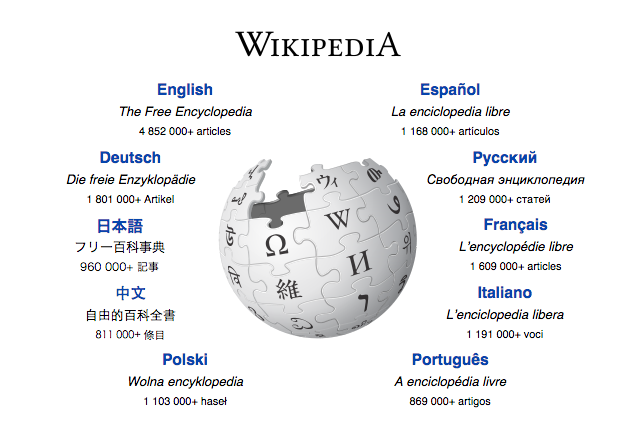Rewriting the Inter-Nyet

Wikipedia comes in many different languages. The English one came first, but on May 20, 2001, the encyclopedia spread to more than a dozen more languages, including Japanese, German, Hebrew, and of particular note, Russian. The Russian one began on the wrong foot; the first entry created read simply “Россия — великая страна” or “Russia is a great nation,” but that was quickly changed to “Россия — родина слонов (ушастых, повышенной проходимости — см. мамонт)” — “Russia is the motherland of elephants (big-eared, improved cross-country capability, see Mammoth).” But despite these inauspicious beginnings, the Russian version of the digital encyclopedia is very strong, with over 1.2 million different entries as of this writing.
For Vladimir Putin’s regime, however, this isn’t good enough. (Or, perhaps, it’s too good.)
On November 14, 2014, Russia’s Presidential Library (“Named After Boris Yeltsin,” as its website notes) announced that the country would be starting an online encyclopedia, one which “will be one of the most popular Russian Internet resources” (they’re very confident) and which will “objectively and accurately present the country and its population.” That latter part was intended as a dig at the Russian Wikipedia; the announcement specifically noted that the library’s project was to “be an alternative of Wikipedia” as Wikipedia, in the eyes of the Russian powers-that-be, “has shown that it does not have enough detailed and reliable information about Russian regions and the life of the country,” despite the 1.2 million entries. The BBC reported that various libraries in the country have come together to collect, in total, over 50,000 primary sources to be used as a basis for the online resource, although it’s unlikely that anyone with an Internet connection will be allowed to edit it. (We can’t have any “motherland of elephants” jokes, after all.)
Unfortunately, the alt-Wikipedia probably isn’t just an innocent attempt to create a resource for Russian citizens. In recent years, Russia has taken various steps to curb use of the Internet. In early 2014, Putin’s government ordered Internet Service Providers to block access to websites run by opposition groups, and around the same time, Putin asserted that the Internet itself was a special project of the CIA. Further, Russia requires that bloggers with more than 3,000 followers “must register with the Moscow’s mass media regulatory agency and conform to rules applied to larger media outlets,” according to Reuters. Some critics of Russia’s official digital encyclopedia, therefore, believe that the goal of the project isn’t to build an alternative to Wikipedia, but replacement.
That said, for the time being, the Wikipedia-killing project doesn’t exist. And for now, the English version of Wikipedia’s entry on the Russian Wikipedia notes that, despite some threats, “access to Wikipedia was never actually blocked in Russia.”
 Bonus Fact: In June of 2004, Wikipedia expanded into another language, one not seen on this planet: Klingon. The Klingon Wikipedia, or “tlhIngan Hol” in its native tongue, ran into problems shortly thereafter. A Wikimedia (the parent organization of Wikipedia) page about the project notes that the encyclopedia “never attracted a community, in part because the fictional origin of the language means that there are no real-world speakers in existence who could form a community,” and that “work was limited by the fact that the Klingon vocabulary is closed and incomplete, leaving no way to discuss many important topics without circumlocutions.” Wikimedia shut down the project in August of 2005. A year and a half later, the site found a new home, here.
Bonus Fact: In June of 2004, Wikipedia expanded into another language, one not seen on this planet: Klingon. The Klingon Wikipedia, or “tlhIngan Hol” in its native tongue, ran into problems shortly thereafter. A Wikimedia (the parent organization of Wikipedia) page about the project notes that the encyclopedia “never attracted a community, in part because the fictional origin of the language means that there are no real-world speakers in existence who could form a community,” and that “work was limited by the fact that the Klingon vocabulary is closed and incomplete, leaving no way to discuss many important topics without circumlocutions.” Wikimedia shut down the project in August of 2005. A year and a half later, the site found a new home, here.
Take the Quiz!: The Most Popular Countries on Wikipedia (in 2009, at least).
From the Archives: Wikipedia Can’t Decide on Wikipedia Founder’s Birthday: True when I wrote it, but now, a decision has been made.
Related: “The Wikipedia Revolution: How a Bunch of Nobodies Created the World’s Greatest Encyclopedia” by Andrew Lih. 4.3 stars on 21 reviews.
